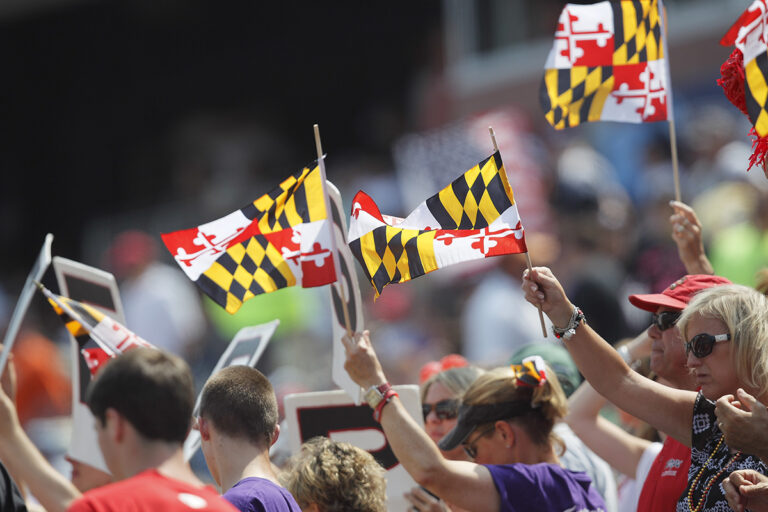
As of 9 a.m. this morning (Nov 23), Maryland sports bettors no longer need to visit a retail sportsbook to get some skin in the game. Online wagering is now live in the Old Line State, with seven brands to choose from on launch day.
Retail sports betting in Maryland has been available since December 2021. However, there’s no real comparison between the two. When it comes to casino gaming, there are pros and cons to both brick-and-mortar and online gambling. But revenue data from other states show that sports bettors prefer playing online by nearly a factor of ten.
There are now 23 states where online sports betting is legal, with a few more pending. Once Ohio, Massachusetts and Maine go live, there will be more states with mobile wagering than without.
On the other hand, regulated online casinos trail far behind. There are only six states where they’re legal, and two of those markets are quite limited.
That leads to an obvious question: Now that it has taken the plunge with online sportsbooks, will Maryland look at iGaming next?
The short answer is that online casinos will likely come to Maryland eventually, but not for a few years.
Maryland: a Prime Candidate for iGaming
On paper, Maryland looks like a natural fit for online gambling.
Social conservatives are generally gambling’s most vigorous political opponents, so Maryland’s liberal political leanings are helpful. It also has a thriving retail casino industry, which has, to date, proven to be a necessary precondition to online casino legislation.
Those retail casinos include properties owned by MGM Resorts, Cordish Companies, Caesars and Penn Entertainment, all of which conduct online gambling already. These companies would surely support any lobbying effort.
“Peer pressure” is also important in politics. Online casino legalization has been an East Coast phenomenon, radiating out from New Jersey as the first state to introduce them. Sharing a long border with Pennsylvania, Maryland doesn’t have to look far to find an example of the success of online gambling.
With a population of 6 million, Maryland wouldn’t be among the largest iGaming markets. But it’s not small either; more importantly, it’s the highest-earning state in the country. It’s certainly a state online casino operators would like to target if they could.
That said, there are a couple of reasons it’s not likely to happen right away.
No One-Two Punches
When sports betting legalization began sweeping the nation in 2017, many assumed that online casino gaming would follow. So far, that hasn’t really proven to be the case.
What does happen is that online sports betting inevitably accompanies online casinos. We have not – and probably never will – see a state legalize iGaming without sports betting along for the ride. There’s not much truth to the idea that sports betting is “safer” than casino gaming, but it’s a sufficiently widespread misconception that legislators find it an easier lift.
Where both forms of online gambling are legal, it’s generally been the case that both came in the same year. The exceptions are New Jersey and Delaware, which legalized online casinos at a time when sports betting was still forbidden by federal law.
Several states have tried to follow up on sports betting with an online casino bill the following year. New York is the prominent recent example, but Illinois and Indiana have also looked promising at times.
So far, none of those efforts have succeeded. The distractions of COVID-19 are surely part of that. However, political capital is also a real thing. Neither voters nor legislators like to do too much, too fast. Somehow, doing everything at once is okay, but after one new form of gambling goes live, there’s a desire to wait and see how it goes before the next effort can get any traction.
Probably, at least some of those other states will see their efforts succeed in the next few years. When that happens, we’ll have a sense of the likely timeline in Maryland.
The Referendum Issue
There’s another factor complicating things for Maryland, which is its own Constitution. Although contemporary Maryland attitudes towards gambling are permissive, it’s one of many states with a constitutional prohibition on gambling for historical reasons.
That means that any new gambling law requires a referendum. It shouldn’t be as much of a problem as it is in other states like California. After all, two sports betting measures failed spectacularly in that state this year, while Maryland’s 2020 referendum was a landslide the other way, with 67% of voters saying “Yes.”
However, it does mean that there needs to be an election for legalization to happen. That takes 2023 off the table, with the 2024 presidential election being the most likely time to see an attempt. That would also allow Marylanders to adjust to the idea of sports betting and alleviate the political capital problem.
Alongside the 2020 sports betting bill, the Maryland Senate attempted to repeal the anti-gambling section of the Constitution, which would have made all of this easier. Unfortunately, that question never made it onto the ballot.
We can therefore expect to see the online casino conversation start next year, but the first serious push to come in 2024. Even if it succeeds, the regulatory process to launch online casinos typically takes about a year. Thus, the best-case scenario for Maryland online casinos is probably 2025. By then, we’d hope there will be more than just six states with iGaming.
Which Maryland Online Sportsbooks Have Launched?
While Marylanders begin that long wait, they can console themselves with the form of online gambling they have.
The lineup of online sportsbooks also tells us who to expect to be offering online casino games when the time comes. Most US operators are full-service companies that integrate their online casino and sportsbook into the same app where that’s legally possible. Some, like BetMGM, even have a poker product.
Here’s who you’ll find in Maryland currently:
- Barstool MD (no review available)
- BetMGM MD
- BetRivers MD
- Caesars MD
- DraftKings MD
- FanDuel MD
- PointsBet MD
Another seven operators are expected to trickle in over the next few months. However, most interested parties will presumably want to launch before the Super Bowl in February at the latest.





